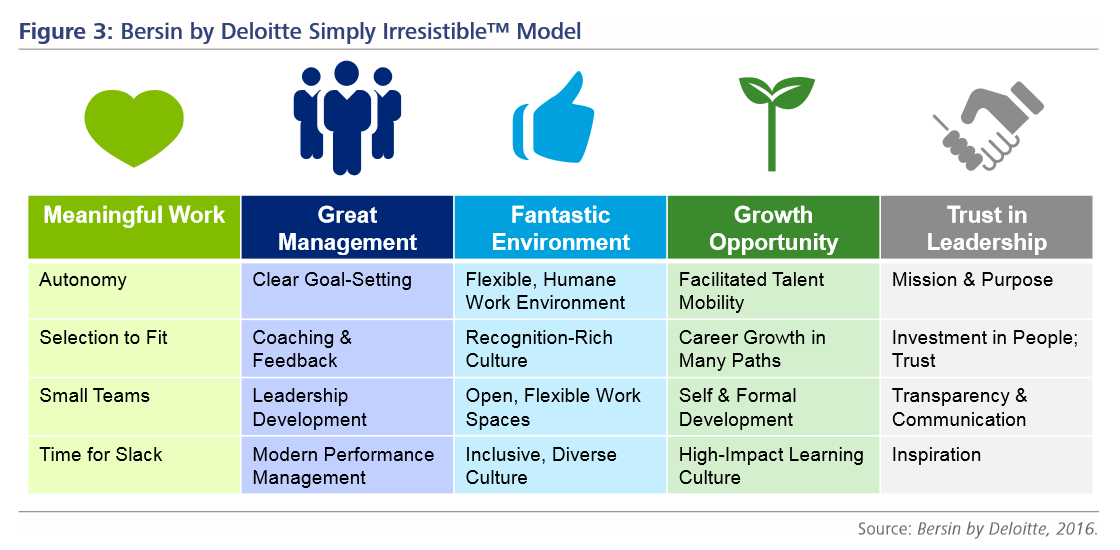
How brand and reputation affect employee engagement
We can very quickly connect the company's reputation with the acquisition of new staff, but how does it affect existing employees?
We often give too little weight to the importance of the reputation of the company in the wider society and its positive and negative effects on employees. This is also confirmed by the Glassdoor survey, where most companies find themselves far from desired. For example, they found that less than 50% of employees would recommend their employer to a friend (Glassdoor Data Labs, December 2015).
We can very quickly connect the company's reputation with the acquisition of new staff, but how does it affect existing employees?
It turns out that the reputation of the company in the wider society is one of the key factors that affect the commitment and dedication of employees. These are extremely complex areas that will become a key priority for HR and team leaders in the next few years, according to trend forecasts.
Every team leader wants to have committed individuals who feel attached to their team and organization as such individuals are more productive and able to adapt to changes and find solutions. In addition, they provide greater customer satisfaction on the one hand and give a sense of community and job satisfaction on the other.
Although many companies are already trying to raise employee engagement, they rarely succeed. This is mainly because of the complexity we face here. There are as many as 20 key factors grouped into 5 areas that affect commitment. They are all important so we cannot rely on just a few.
A sense of belonging and commitment are complex emotional and mental state that is highly dependent on each individual's internal needs and motivators. Because of our diversity, everyone needs different incentives that increase their sense of belonging and encourage commitment. Therefore, the company must pay attention to just about everyone.

In the following, I will introduce the areas in more detail, and highlight how they can be affected by a company's reputation and vice versa, how they change the company's reputation.
The reputation of the company does not usually affect the first area of commitment and dedication. But there is a stronger influence in the opposite direction. Meaningful work can indirectly affect a company's reputation, for example when work is socially beneficial. This is especially true at the level of state-owned companies, public administration and charitable organizations, which, because of socially beneficial work, may have a positive reputation in society, or because of the absurdity of it (eg bureaucracy) a negative reputation.
Although corporate leadership is crucial for many businesses, it does not directly affect the reputation of the company in wider society. In any case, the reputation of the company can influence leadership, especially through the ability to attract or repel good leaders to the company.
The company environment, especially when it is bad, often finds itself in the media. For example, in August 2015, the New York Times published a report on a very unusual culture at Amazon. Employees are encouraged to be brutally critical of each other, work 80 hours a week, always be accessible, and to communicate dissatisfaction with the work of a coworker to their superiors. In the article, Amazon is presented as a kind of experiment on how far you can push workers to achieve their goals. The article has had a very negative impact on Amazon's reputation in the US (in August 2015, Amazon's Glassdor rating was only 3.4, only 63% of employees would recommend their employer), many experts believe that Amazon will not be able to keep their best employees or gain new ones without some major changes (Amazon has a 3.6 rating in September 2017 and a 68% recommendation). On the other hand, a fantastic environment in itself rarely reaches the media. But with a good PR strategy it can be crucial in shaping the company’s image in society. But the impact of a company’s reputation on the environment in the company is relatively small.
In principle, this area does not affect the public image of a company, but it does affect the image of a company within a discipline, where the “myth” is often created about better conditions in other companies in the same discipline. Thus, personnel in pharmaceutical companies often changes jobs because another company has more opportunities for personal and career development, even if they are offering lower pay. There is, in principle, no direct link between the company image and the opportunity for development.
This area is extremely related to the company's reputation. The best example of this is Apple, which has developed an almost fanatical customer loyalty through a very clear message and vision of Think Different. The impact can also be reversed, when because of its poor reputation, vague vision and outdated values, the company rebuilds the culture and values, or even replaces members of the board.
The development of engagement and the feeling of belonging requires a great deal of input from the company, it also transfers to other areas, in particular the company’s reputation in the wider society. This is especially true in the area of company environment and the functioning of the company's management. Unfortunately, with the exception of few companies, it’s importance in Slovenia is still very limited and not supported by means that would enable real change.
Dr. Luka Jan
Main sources:
Bersin by Deloitte. 2014. The Simply Irresistible Organization™ Engaging the 21st century workforce
Daniel Pink. 2009. The Surprising Truth About What Motivates Us
Glassdoor Data (https://www.glassdoor.com)
Zeynep Ton. 2014. The Good Jobs Strategy: How the Smartest Companies Invest in Employees to Lower Costs and Boost Profits. Cambridge, MA, MIT Press.
Jodi Kantor, David Streitfeld. 2015. Inside Amazon: Wrestling Big Ideas in a Bruising Workplace. The New York Times (15.8.2015).
Članek je bil objavljen v reviji HRM
We can very quickly connect the company's reputation with the acquisition of new staff, but how does it affect existing employees?
It turns out that the reputation of the company in the wider society is one of the key factors that affect the commitment and dedication of employees. These are extremely complex areas that will become a key priority for HR and team leaders in the next few years, according to trend forecasts.
Every team leader wants to have committed individuals who feel attached to their team and organization as such individuals are more productive and able to adapt to changes and find solutions. In addition, they provide greater customer satisfaction on the one hand and give a sense of community and job satisfaction on the other.
Although many companies are already trying to raise employee engagement, they rarely succeed. This is mainly because of the complexity we face here. There are as many as 20 key factors grouped into 5 areas that affect commitment. They are all important so we cannot rely on just a few.
A sense of belonging and commitment are complex emotional and mental state that is highly dependent on each individual's internal needs and motivators. Because of our diversity, everyone needs different incentives that increase their sense of belonging and encourage commitment. Therefore, the company must pay attention to just about everyone.

In the following, I will introduce the areas in more detail, and highlight how they can be affected by a company's reputation and vice versa, how they change the company's reputation.
1) Doing meaningful and important work
The key role of the company and its managers is to provide “good” work to its employees. This is a job that suits the worker, gives him the right tools and enough autonomy to be creative and have enough time to do the job well. Research shows that if we empower employees, give them more decision-making power, enough time and the right support, the company will have more profit (Zeynep Ton. 2014). In his book Drive, Daniel Pink describes meaningful work with three concepts: AUTONOMY, MYSTERY, and PURPOSE.The reputation of the company does not usually affect the first area of commitment and dedication. But there is a stronger influence in the opposite direction. Meaningful work can indirectly affect a company's reputation, for example when work is socially beneficial. This is especially true at the level of state-owned companies, public administration and charitable organizations, which, because of socially beneficial work, may have a positive reputation in society, or because of the absurdity of it (eg bureaucracy) a negative reputation.
2) Great guidance
People thrive when they have good mentors, feedback and opportunities for development. Leaders who criticize, ask for too much and avoid communication, bring fear and stress to the workplace. Particularly highly effective executives can make a significant contribution to employee engagement with their approach. They help formulate clear goals, use elements of coaching in their work and constantly provide constructive feedback. All this has a strong impact on employee engagement, which is why leaders are critical to the success of an organization. The better they know the motivators of their employees, the better they can take care of them. But be aware that leadership is about working with people, not giving tasks.Although corporate leadership is crucial for many businesses, it does not directly affect the reputation of the company in wider society. In any case, the reputation of the company can influence leadership, especially through the ability to attract or repel good leaders to the company.
3) Fantastic environment
An inclusive, fun and flexible environment that adapts to the needs of employees brings fresh wind and momentum that employees value. More. The environment should allow every employee to feel accepted, at home, regardless of race, religion, age or mindset. A good environment helps the worker to balance his personal and work life, and there is increasing talk of adjusting the space around their needs, such as “design thinking” at Stanford school.The company environment, especially when it is bad, often finds itself in the media. For example, in August 2015, the New York Times published a report on a very unusual culture at Amazon. Employees are encouraged to be brutally critical of each other, work 80 hours a week, always be accessible, and to communicate dissatisfaction with the work of a coworker to their superiors. In the article, Amazon is presented as a kind of experiment on how far you can push workers to achieve their goals. The article has had a very negative impact on Amazon's reputation in the US (in August 2015, Amazon's Glassdor rating was only 3.4, only 63% of employees would recommend their employer), many experts believe that Amazon will not be able to keep their best employees or gain new ones without some major changes (Amazon has a 3.6 rating in September 2017 and a 68% recommendation). On the other hand, a fantastic environment in itself rarely reaches the media. But with a good PR strategy it can be crucial in shaping the company’s image in society. But the impact of a company’s reputation on the environment in the company is relatively small.
4) Opportunity for development
Prospective individuals often leave businesses where they have no real opportunity to develop and thrive. Companies that invest in HR, career and mobility often outperform others in the industry, are more flexible and innovative, and have more satisfied and fulfilled employees. This area includes opportunities for development (eg mentoring, purposefully assigned projects for personal growth), mobility (internal mobility, allowing the employee to take up a new role as well as external mobility - moving between departments, locations, countries) and the presence of a development culture , which promotes the education and development of individual’s competences.In principle, this area does not affect the public image of a company, but it does affect the image of a company within a discipline, where the “myth” is often created about better conditions in other companies in the same discipline. Thus, personnel in pharmaceutical companies often changes jobs because another company has more opportunities for personal and career development, even if they are offering lower pay. There is, in principle, no direct link between the company image and the opportunity for development.
5) Trust in leadership
Modern corporate executives know that it is the soul of the company that drives commitment and efficiency. The company’s mission is what encourages every employee. It is something that affects everyday tasks, relationships with employees, customers and partners.This area is extremely related to the company's reputation. The best example of this is Apple, which has developed an almost fanatical customer loyalty through a very clear message and vision of Think Different. The impact can also be reversed, when because of its poor reputation, vague vision and outdated values, the company rebuilds the culture and values, or even replaces members of the board.
The development of engagement and the feeling of belonging requires a great deal of input from the company, it also transfers to other areas, in particular the company’s reputation in the wider society. This is especially true in the area of company environment and the functioning of the company's management. Unfortunately, with the exception of few companies, it’s importance in Slovenia is still very limited and not supported by means that would enable real change.
Dr. Luka Jan
Main sources:
Bersin by Deloitte. 2014. The Simply Irresistible Organization™ Engaging the 21st century workforce
Daniel Pink. 2009. The Surprising Truth About What Motivates Us
Glassdoor Data (https://www.glassdoor.com)
Zeynep Ton. 2014. The Good Jobs Strategy: How the Smartest Companies Invest in Employees to Lower Costs and Boost Profits. Cambridge, MA, MIT Press.
Jodi Kantor, David Streitfeld. 2015. Inside Amazon: Wrestling Big Ideas in a Bruising Workplace. The New York Times (15.8.2015).
Članek je bil objavljen v reviji HRM
Tips on creating the right teams
New developments in activities, teamwork and training
We create solutions for your team
Dedicated to developing innovative teambuilding programs, which help companies and teams.







